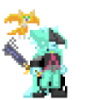Leaderboard
Popular Content
Showing content with the highest reputation on 09/21/2015 in all areas
-
Not going to post a source breakdown this time, but make sure you listen to the bass, melodies, and the arpeggiator for the source usage.2 points
-

Mega Man X: The Sigma Fortress Remix Gauntlet 2015
Tuberz McGee and one other reacted to Troyificus for a topic
My entry was submitted early and unfinished due to a death in my family. Not looking for sympathy; just informing due to the rather rough and incomplete nature of my entry.2 points -

HELP NEEDED! ReMix Tagging Project! (Genres, Moods, Instrumentation, etc.)
paxl13 and one other reacted to SystemsReady for a topic
Yeah, the problem with trance is that what is labeled "trance" has changed so much over the years that they barely resemble each other. Compare Hello Strings by Synergy (released on Armin van Buuren's label) to Armin van Buuren's D# Fat. They're both on trance labels but barely sound alike. Of course, it doesn't help that trance isn't really strictly defined by beat pattern and time signature like house, dubstep, etc. is. Trance nowadays tends to be applied to anything put out by a trance artist...even trance-y songs aren't considered "trance" if, say, put out by deadmau5 (I Remember is considered progressive house, not trance, despite being more "trance"-like than anything van Buuren's put out in the last five years). It's very muddied. [/nerd]2 points -

Finding myself too dependant of "real instruments"
Garpocalypse reacted to Jakos for a topic
Hello everyone. Recently I've found myself using too much sfz libraries instead of synthesizing sounds by my own, and also I think part of doing that is my fear of not knowing what I'm doing. I consider myself a very antiquated or classical musician, I prefer orchestral music over electronic music (that doesn't mean I don't like it) and maybe that's why I also find my self very dependant of orchestral or real instruments sfz / plugins. So I'm here to ask for some help on how can I "grow up" and let all this orchestral thing apart to learn more about electronic souds or how to make music without having all the "classical" thing in my head while I do it (like tending to use classical instruments for example).1 point -

Heart of a Gamer: A Tribute to Satoru Iwata - History
djpretzel reacted to The Damned for a topic
Like hell there won't be.1 point -

Workshop Discussion and Guidelines (read before posting!)
Eino Keskitalo reacted to Rozovian for a topic
For those having problems getting a mod review, there are some quirks of the new forum software that complicates things. In the old forums, it was just a matter of selecting mod review from a list of approved and predefined thread prefixes. Now you have to write it yourself... and spell it correctly. Here's a few tips on how to get it right: 1. Spell it with a hyphen. Mod-Review, mod-review; uppercase or lowercase doesn't matter, but whether there's a space or a hyphen matters. The quick link for mods has been updated to cover all these spellings, but if a mod just clicks on the tag, they'll only get the threads with the tag spelled the same way. The old forum had it spelled with a hyphen, so we'll stick with that. 2. Make sure to check the "Use first tag as prefix", as that's the most visible way to mark your thread for mod review. Also, make sure to enter mod-review as the first tag in the tags field. 3. You change tags in the Full Editor. 4. If these things don't don't change anything or if you still aren't getting a mod review, PM a mod or two directly. We're here to help. Let us know if we've missed your thread (give us a week or two, though, but if it's been a month, PM us). -- And while we're at it, do you think there are too many pinned topics on the board?1 point -

Heart of a Gamer: A Tribute to Satoru Iwata - History
Chernabogue reacted to Themysteriousassassin for a topic
Live trumpets? Sounds sweet. Kirby tracks are written in a way that orchestral arrangements make sense, which is where I think Chernabogue is going. It totally could be something else, but my prediction is orchestral. Else live instruments don't really make sense. But then again, what do I know? All I know is that its going to be a pleasure to my ears.1 point -

Mega Man X: The Sigma Fortress Remix Gauntlet 2015
Tuberz McGee reacted to Jorito for a topic
I blame Eino and Tuberz for coming up with the team name and making me join in on it. The alternative was getting tubed Having said that, don't feed them this kind of inspiration, it's at your own risk!1 point -

Mega Man X: The Sigma Fortress Remix Gauntlet 2015
Tuberz McGee reacted to KingTiger for a topic
Next time the Maverick Astley team does a compo, they should find a way to slip in John Cena, seeing as he's the new rick roll.1 point -

Heart of a Gamer: A Tribute to Satoru Iwata - History
timaeus222 reacted to Chernabogue for a topic
Got the live trumpets from m contact (who happened to be French as well lol). I'll try to mix that soon-ish, and will wait for Tuberz's acoustic guitars.1 point -

Crisis Core - Final Fantasy 7 - Wings Of Freedom (Master Mi Remix)
timaeus222 reacted to Kat for a topic
From personal experience? Ditch the meter and rely on your ears. Don't turn the harp down 2dB just because your meter implies that to be the solution. Make very slight adjustments and listen to the results on a variety of mediums(open speakers, headphones, earbuds, monitors if available) and get a feel for how it sounds. People are going to listen to it in different ways, so you should approach it in different ways. For that you'll need your ears, not a meter. A meter is certainly helpful, but don't let it make the decisions for you.1 point -

What am I missing?
Slimy reacted to Nabeel Ansari for a topic
Making your own sound is okay, but a good sound is never going to fix your writing. Music is about ideas. Writing music is about presenting those ideas, developing them, showing them in new lights, and referencing them (among other things I'm forgetting). The most standard musical "main idea" is called the melody. The melody has something to say in the music, and it's closely related to chords. The chords define how the melody functions (its core essence) and the melody itself is the representation (or if you'd like, the execution) of that core essence. I notice a lot of people kinda just lean on one of them sometimes, especially people getting their chops from OCR. They write the melody, then kinda just add chords that sound like they fit underneath, or, they have some chord progression and then just slap in some notes in a lead synth to make their melody. This doesn't ever really work because it doesn't really wield an understanding of why chords and melodies are so closely related. A melody has a start and an end. Depending on how out your style is, your melody may or may not resolve. It may move across different tonalities or it could just be something really simple and catchy. Sometimes, melodies are very transparent and non-catchy (and that's fine, and if anyone tells you otherwise you smack them upside the head) when the musical presentation is supposed to be about color (harmony/texture) and not statement (main idea presentation). Sometimes you don't have melodies at all, instead your music is about presenting and manipulating color. Even though melodies are hard to write, color music (most popular in the impressionist era) is actually harder to write, since it's kind of abstract. In electronic music, it's a little easier, since you're forgiven for lots of repetition (which you can use to build up your tracks more linearly instead of moving around organically). You should listen to music, especially symphonies. The old guys were masters of using music as a means of communicating ideas. They had their melodies (themes/motifs), then gave them to different instruments, changed their keys, swapped major/minor, chopped them up, etc. All of these things are valid ways of manipulating and presenting ideas. When you're writing music, you have to have "something". There has to be something where you say "I want this to be developed". It can be a cool synth arp, or a wacky chord sample, or it can be a full melody. You have to build your track around presenting whatever that is. You need to foreshadow it, lead into it, show it, then hide it, lead out of it, bring it back in a different way (or the same way). Don't do all that stuff in that order all the time, the point is there's all these things you can do with one idea, so the more you do, the longer your piece/track gets and the more dynamic it is. Then start piecing together ideas and having overarching progressions. is a perfect example, since this band does this thing a lot where they build a track out of 3 or 4 main ideas. At 1:36, the entire direction (rhythmically and harmonically) of the track shifts someplace else. The mood and part-writing style changes considerably. It's a "new idea", it's "we're done with that, here's something new". Again, they do this at 2:15, and I would argue the second idea foreshadows the third one with the way its harmony works. That's up for debate, but the point is the song moves to different places. That's progression! In each of the three sections, they do a lot with their main ideas (having melodies, b-section melodies, changing texture, changing chords), but the sections also flow together as one big unit. This is just a snippet of advice. Learning how to write takes lots of practice, study, and mentors. I can't fix you in a forum post, but I can help change your mindset a little. My recommendation is learning more music theory. You need to get past chords and rhythms, that stuff is where people usually stop and it's not really what music theory is about at all, and thus it pollutes the general populace understanding about music theory and people think it's too basic or rigid to have anything general to say about music.1 point
